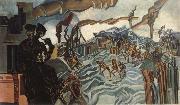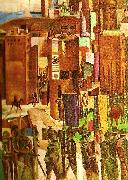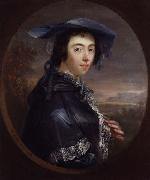wyndham lewis Olja Måleriet ReproduceringAll wyndham lewis Oil PaintingsBritish painter and writer. He attended Rugby School and then studied painting at the Slade School of Art, London (1898-1901), where he earned a reputation both as a draughtsman and as a poet. His early artistic and intellectual mentors were Augustus John and Thomas Sturge Moore. From 1902 to 1908 Lewis travelled widely in Europe and studied in many of the major museums. He was one of the first British artists to be aware of, and interested in, Cubism and Expressionism, though little of his work before 1909 survives as evidence of his early development. In late 1908 Lewis settled in London and as well as painting began to publish satirical short stories that take a mechanistic view of human social behaviour, evident in the deliberately clumsy and grotesque figures in his art of the period 1909 to 1912. By 1910 he was including Cubist elements in his watercolour drawings (his preferred medium), and by 1912 he had developed his own linear vocabulary of forms, indebted to Cubist, Futurist and Expressionist forms, which gives an often ironic visual dimension to the themes of his fiction. Another important influence on his art was that of Japanese woodblock prints, as seen in the watercolour drawing later called The Vorticist (1912; Southampton, C.A.G.). By 1913 he was popularly seen as the leading British avant-garde artist. |
|||

|
|||
|
|
|||
|
||||||||
| wyndham lewis British painter and writer. He attended Rugby School and then studied painting at the Slade School of Art, London (1898-1901), where he earned a reputation both as a draughtsman and as a poet. His early artistic and intellectual mentors were Augustus John and Thomas Sturge Moore. From 1902 to 1908 Lewis travelled widely in Europe and studied in many of the major museums. He was one of the first British artists to be aware of, and interested in, Cubism and Expressionism, though little of his work before 1909 survives as evidence of his early development. In late 1908 Lewis settled in London and as well as painting began to publish satirical short stories that take a mechanistic view of human social behaviour, evident in the deliberately clumsy and grotesque figures in his art of the period 1909 to 1912. By 1910 he was including Cubist elements in his watercolour drawings (his preferred medium), and by 1912 he had developed his own linear vocabulary of forms, indebted to Cubist, Futurist and Expressionist forms, which gives an often ironic visual dimension to the themes of his fiction. Another important influence on his art was that of Japanese woodblock prints, as seen in the watercolour drawing later called The Vorticist (1912; Southampton, C.A.G.). By 1913 he was popularly seen as the leading British avant-garde artist. |
||||||||
|
|
||||||||
| Måleriet Identifieringen :: 57045 a battery shelled mk247 c.1919,oil on canvas,72x125.125 in,182.8x317.8 cm,imperial war museum,london,uk |
||||||||
|
|
||||||||
| Måleriet Identifieringen :: 67913 barcelonas kapitulation se |
||||||||
|
|
||||||||
| Måleriet Identifieringen :: 80470 Portrait of Margaret 1753(1753) Medium Oil on canvas Dimensions 76 x 63.3 cm (29.9 x 24.9 in) cyf |
||||||||
|
|
||||||||
|
| FÖREGÅENDE KONSTNÄR Nästa Konstnär | |||||||
|
|
||||||||
|
wyndham lewis British painter and writer. He attended Rugby School and then studied painting at the Slade School of Art, London (1898-1901), where he earned a reputation both as a draughtsman and as a poet. His early artistic and intellectual mentors were Augustus John and Thomas Sturge Moore. From 1902 to 1908 Lewis travelled widely in Europe and studied in many of the major museums. He was one of the first British artists to be aware of, and interested in, Cubism and Expressionism, though little of his work before 1909 survives as evidence of his early development. In late 1908 Lewis settled in London and as well as painting began to publish satirical short stories that take a mechanistic view of human social behaviour, evident in the deliberately clumsy and grotesque figures in his art of the period 1909 to 1912. By 1910 he was including Cubist elements in his watercolour drawings (his preferred medium), and by 1912 he had developed his own linear vocabulary of forms, indebted to Cubist, Futurist and Expressionist forms, which gives an often ironic visual dimension to the themes of his fiction. Another important influence on his art was that of Japanese woodblock prints, as seen in the watercolour drawing later called The Vorticist (1912; Southampton, C.A.G.). By 1913 he was popularly seen as the leading British avant-garde artist. |
||||||||
|
|
||||||||
|
KOMMA I KONTAKT MED Oss |








